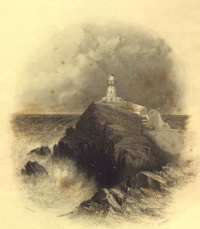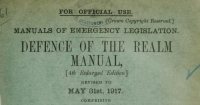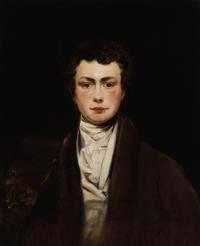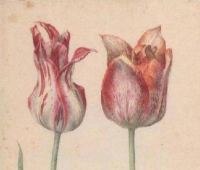- First Friday — a devotion to the Sacred Heart of Jesus, involving attendance at Mass on the first Friday of the month for nine consecutive months in the hope and promise of a good death. ((Wikipedia.))
- mares' tails — (("long straight streaks of cirrus, supposed to foretoken stormy weather" – OED.))
- reboant — (("rebellowing, re-echoing loudly" chiefly poetical – OED.))
-
 Bailey Light — the Bailey Lighthouse on Howth Head.
Bailey Light — the Bailey Lighthouse on Howth Head. - Ave, Maris Stella — Latin, "Hail, star of the sea" – the first line of a Vespers hymn to the Virgin Mary. ((Wikipedia.))
- the Cape — Cape Colony, the British territory in southern Africa where Jim was born.
-
 Sargasso — the Sargasso Sea in the north Atlantic, "home to seaweed of the genus Sargassum, which floats en masse on the surface".
Sargasso — the Sargasso Sea in the north Atlantic, "home to seaweed of the genus Sargassum, which floats en masse on the surface". - Where goes the tide ... — this couplet, spoken here by Jim, is the English rendering of the Irish couplet spoken by Doyler in Chapter 4.2 – Cá dtéigheann an taoide nuair thagann an trághadh? / Mar a dtéigheann an oidhche nuair thagann an lá? ((saying – Dinneen, Irish-English Dictionary, 1927.))
- I say — an exclamation reminiscent of "schoolboy" literature (("I say, you fellow, is your name Brown?" – Hughes, Tom Brown's Schooldays, 1867.))
- Mary's month of May — May traditionally in Catholic devotion is "a month which the piety of the faithful has long dedicated to Mary, the Mother of God" – Pope Paul VI: Encyclical on the Month of May, 1965.))
- piles off sitting here — from the folk belief that haemorrhoids (piles) are caused by sitting on cold surfaces.
- blue-gone — ? gone blue, i.e. faded to a shiny hue from the original black.
- same like — same as. ((colloquial – Partridge HS.))
- split on me — betrayed me ((split on one: "to betray confidence" – Farmer 1904.))
- in bother — in trouble. ((bother: "petty trouble, worry" – OED.))
- himself — here meaning Doyler's father. ((himself: "the man of the house; quasi-respectful reference to any male" – Slanguage.))
-
 Bovril briefly was British beef — presumably from a tram advertising Bovril, a popular beef extract used for making hot "nutritious" drinks.
Bovril briefly was British beef — presumably from a tram advertising Bovril, a popular beef extract used for making hot "nutritious" drinks. - slip-jig — a jig in 9/8 time, i.e. with three beats to a bar as opposed to the more standard 2 beats (6/8 time) used in most jigs. ♫♫
- the Lock-out — The Dublin Lock-out of 1913, a bitter and violent industrial dispute between the Dublin employers and the poorer Dublin workers led by Jim Larkin.
- Clare — <
- are you straight? — the question is taken from the test for membership of the 18th century republican movement, United Irishmen.
- a crack — (("the time occupied by a crack or shot; a moment, instant" colloquial – OED.))
-
 Full steam ahead ... — the rhyme was published in Connolly's newspaper, Workers' Republic, 1915. It refers to John Redmond, leader of the Irish Parliamentary Party, and his encouragement of Irish nationalists to enlist in the British Army.
Full steam ahead ... — the rhyme was published in Connolly's newspaper, Workers' Republic, 1915. It refers to John Redmond, leader of the Irish Parliamentary Party, and his encouragement of Irish nationalists to enlist in the British Army. - Sinn Feiner — a colloquial term for a supporter of Sinn Féin, at this time a small bourgeois nationalist party.
- unchancy — (("not safe to meddle with" – OED.))
- naphtha flares — petroleum lights whose "flaring" flame illuminated stalls and shop-fronts. ((naphtha: "obsolete name for petroleum" – Collins.))
-
 Dora — "jocular personification" (OED) of the Defence of the Realm Act, first passed in August 1914 upon the outbreak of war. Amongst its wide-ranging stipulations (e.g. against flying kites, relaxed pub-drinking hours, weather reporting, whistling for taxis in London streets) was the criminal offence of "defacing Government property" – which a recruiting poster was.
Dora — "jocular personification" (OED) of the Defence of the Realm Act, first passed in August 1914 upon the outbreak of war. Amongst its wide-ranging stipulations (e.g. against flying kites, relaxed pub-drinking hours, weather reporting, whistling for taxis in London streets) was the criminal offence of "defacing Government property" – which a recruiting poster was. - in the arms of Murphy — asleep. (("illiterate perversion of Morpheus" – OED.)) Morpheus: god of dreams.
- gaum — (("a soft, foolish person" pejorative – Slanguage.))
- widow's stoop — the bent posture due to senile osteoporosis. (("When I met her she was very old – well into her nineties – and bowed double with osteoporosis or widow's stoop as it was called" – Victorian web.))
- brawn — (("a seasoned jellied loaf made from the head of a pig" British – Collins.))
- corned beef — (("beef cooked and then preserved or pickled in salt or brine, now often canned" – Collins.)) (("Great big barrels of brine stood outside their shops with pigs' heads, whole and half, and pigs' tails, and corned beef. All you had to do was to plunge your arm down into the brine and bring up your Sunday joint" – Johnston, "Around the Banks of Pimlico", 1985.))
- after you with the push! — (("a London street catchphrase addressed with ironic politeness to one who has roughly brushed past" ca. 1900-1914 – Partridge HS.))
- I'll learn yous manners — I'll teach you manners. ((learn: "to teach" now vulgar – OED.))
- puck — punch. (("from Irish poc, a short, sudden blow, esp. of ball in hurling" – Slanguage.))
- red spirit — methylated spirits, from the dye added to discourage consumption. (In Dublin more usually known as red biddy: "Sean knew by the dangerous glitter in her dark eyes that the spirit of red biddy had taken full possession of her" – O'Casey 3.)
-
 Oft in the stilly night ... — song by Thomas Moore (1779-1852), "the bard of Ireland", until the last century the most popular of Irish song-writers. It was first published in his National Airs, 1818. It's a song of youthful friendship, and of the loss of friends, regretted now in older age. ♫♫
Oft in the stilly night ... — song by Thomas Moore (1779-1852), "the bard of Ireland", until the last century the most popular of Irish song-writers. It was first published in his National Airs, 1818. It's a song of youthful friendship, and of the loss of friends, regretted now in older age. ♫♫ - licence to go hawking in the street — punning hawking (coughing) and hawking (selling wares in the street, which required a licence).
- gobshite — (("a despicable individual" from Irish gob, "beak, bill, mouth" + shite, IE form of "shit" – Slanguage.))
- a body — a person. (("an individual" – OED.))
- decks me — sees me, catches me. ex ((dekko: "to look, look at" originally army slang – OED.))
- fecked — stolen, pilfered. also ((feck: "a euphemism for 'fuck' in all senses except 'to fornicate'" – DILR.))
- for to sell it — in order to sell it. IE
- blackguarding — ((blackguard: "to abuse or revile in scurrilous terms" – OED.))
-

- whore's git — offspring of a whore. ((git: term of abuse – Slanguage.)) from ((get: "brat ... a bastard; hence as a general term of abuse" now dialect and slang – OED.))
- did bounce him on me — ((bounce: "to bluff (a person)" military – Partridge HS.)) (("to cheat, to swindle" – Farmer 1904.)) Mr Doyle here is surely "telling stories". The son must have been three or four years old by the time Mr Doyle married the boy's mother: at which point there can be little question of "bouncing".

| UK | US-h | US-p | |
|---|---|---|---|
| Pages | 65-73 | 63-71 | 54-62 |
| POV | Jim | ||
| Where | Sea-wall, streets of Glasthule | ||
| When | Friday late evening, May 7 1915 | ||